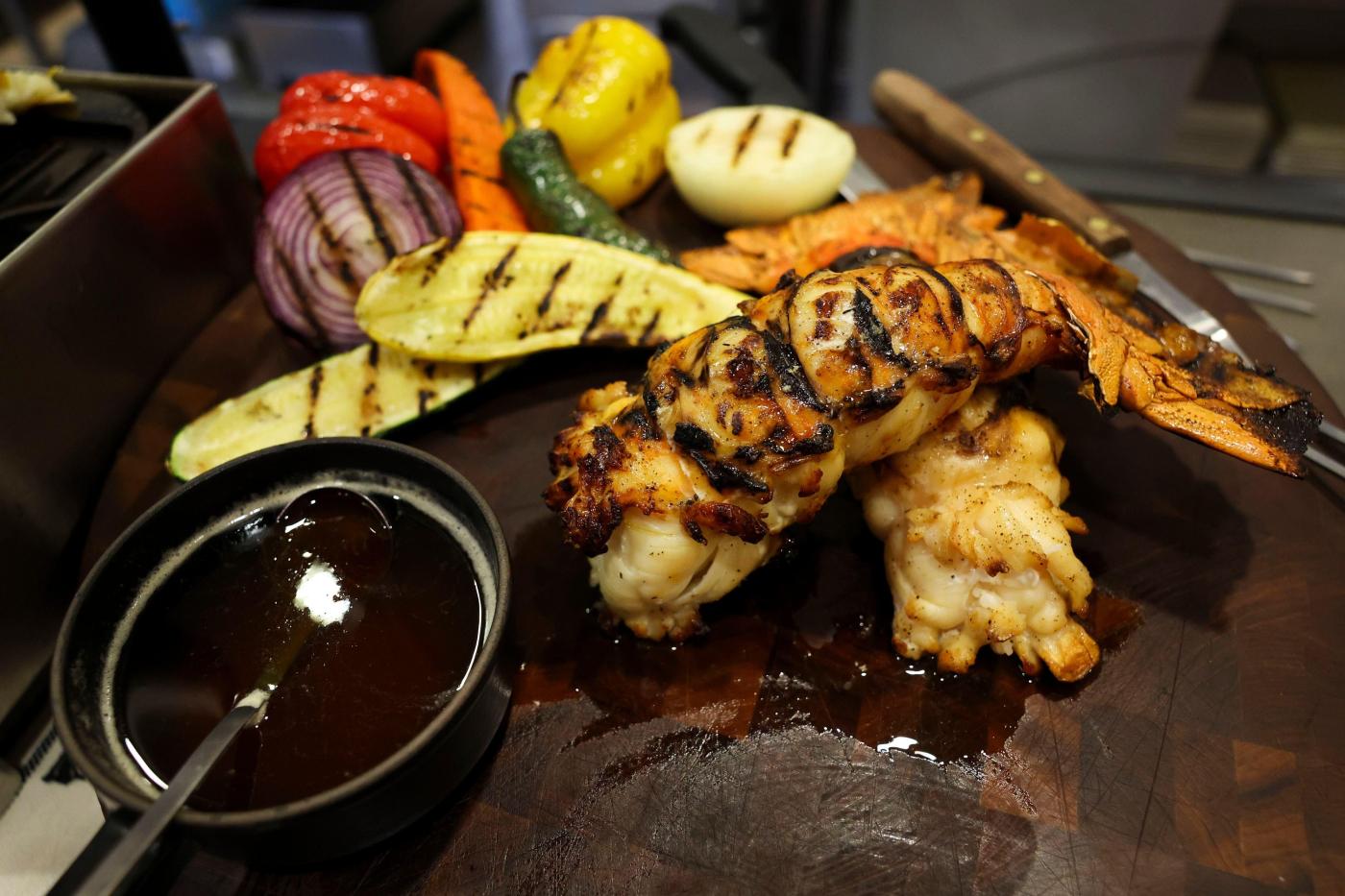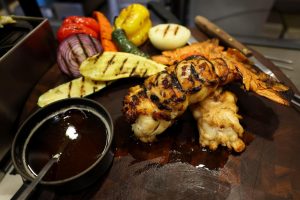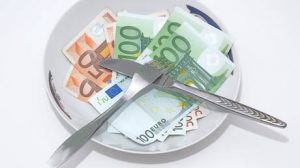
From neon hot dogs to wagyu beef, Chicago-based Levy cooks up Vegas-style menu for Super Bowl at Allegiant Stadium
As Bears fans are once again left cheering for a top draft pick in the waning weeks of a losing NFL season, another local team is busy gearing up for its sixth Super Bowl since the dawn of the new millennium.
Chicago-based Levy will be back in the Big Game in February as the food and beverage provider for Super Bowl LVIII at Allegiant Stadium in Las Vegas. The company is planning a glitzy Vegas-style menu with everything from carved lobster tail and wagyu tenderloin to neon hot dogs, hoping to sate 65,000 football fans and score points in the competitive hospitality industry.
With seats selling for between $10,000 and $45,000 each on the official NFL Ticket Exchange, attendees are expecting a lot more than a warm hot dog and a cold beer.
“The Super Bowl is the NFL’s biggest stage,” said Andy Lansing, 63, president and chief executive of Levy. “And so the Super Bowl for us is our biggest stage.”
Launched as a Chicago restaurant group more than 45 years ago, Levy has evolved into a leading sports and entertainment hospitality company with more than 300 venues in North America. That includes providing food and beverage service for 112 professional sports teams in 36 arenas, 24 stadiums and 42 ballparks.
Chicago-area sports venues served by Levy include Wrigley Field, United Center, Guaranteed Rate Field and Now Arena in Hoffman Estates.
Levy has been the food and beverage partner for Allegiant Stadium, home of the Las Vegas Raiders, since it opened in 2020. When the NFL named Allegiant the host venue for Super Bowl LVIII, it meant Levy was back in the Big Game for the first time since feeding 70,000 fans at Mercedes-Benz Stadium in Atlanta in 2019.
With success from the last Super Bowl adding dozens of clients to Levy’s roster, the company has been all in on the upcoming game for months, cooking up menu offerings in its Chicago test kitchen, vetting everything from soup to nuts.
On a November morning, Lansing, the company’s top chefs and the on-site executive team from Allegiant Stadium gathered at Levy’s North Michigan Avenue headquarters for a crucial taste testing, hoping to winnow down the items that will be served at the suites and private clubs on Super Bowl Sunday.
Despite the early hour, everything was on the table, including gridiron smash burgers, crispy Asian wings, chicken and waffles, lobster tail and giant double-stuffed potatoes.
“It’s not the easiest thing in the world to eat all day long, most days of the week,” Lansing said. “It comes with its happy challenges.”
The mission to make tens of thousands of fans happy on any given Sunday began with one Chicago restaurant.
The company started in 1978 when brothers Larry and Mark Levy took over D.B. Kaplan’s, a delicatessen in Water Tower Place, enlisting their mother, Eadie, to shore up the restaurant with her family recipes. While D.B. Kaplan’s closed in 1995, Levy’s has since built a small, well-regarded restaurant group, with about a dozen locations scattered across the country, including Jake Melnick’s Corner Tap and River Roast in Chicago.
Its bread-and-butter, however, is sports and entertainment hospitality, which launched as a side gig in 1982 when the White Sox recruited Levy to cater the skyboxes at Comiskey Park. Since then, Levy has evolved into a hospitality giant with $4.4 billion in annual revenue and venues that run the gamut from minor league ballparks and NASCAR racetracks to NBA arenas and NFL stadiums.
Levy’s first Super Bowl was 25 years ago in Miami, when the Denver Broncos defeated the Atlanta Falcons 34-19. Lansing’s most vivid memory of the game was racing around town before kickoff to find the right green tea for Cher, who sang the national anthem.
Lansing, a lawyer who grew up in north suburban Highland Park, joined Levy in 1988 as general counsel before shifting to the business side three years later. He was named president in 1995, and succeeded Larry Levy as chief executive in 2004.
Levy is now owned by British food service giant Compass Group, which bought a 49% stake for $87 million in 2000, and acquired the rest of the company for $250 million in 2006.
Its top competitors in the sports and entertainment hospitality business include Aramark, which is headquartered in Philadelphia, and Buffalo-based Delaware North.
In 2013, Aramark struck a 10-year deal to provide food and beverage at Soldier Field, which is owned by the Chicago Park District and home — at least for now — of the Chicago Bears. The Park District and Bears have put out a request for proposal for a new hospitality contract beginning next year.
The rights to feed Bears fans would presumably also be up for grabs if the team builds a new stadium in Arlington Heights or another locale. In February, the team closed on its $197 million purchase of Arlington International Racecourse, but plans to develop the 326-acre site into an entertainment district anchored by a domed stadium have stalled over property tax concerns.
“As we said publicly back in September, we continue to have dialogue with officials in Arlington Heights,” the Bears said in a statement this month.
While the Bears have played in two Super Bowls, including the team’s 1986 drubbing of the New England Patriots in New Orleans, Chicago has never hosted the Big Game, which is usually held in warm weather climates or inside a dome. Soldier Field is also the smallest venue in the NFL with a 61,500-seat capacity.
The Bears have touted a new enclosed stadium in Arlington Heights as “worthy of hosting global events such as the Super Bowl.”
Allegiant Stadium, which drew the Raiders to move from Oakland to Las Vegas, also landed the city its first Super Bowl, which is set for Sunday, Feb. 11. That put Levy, which has contracts for nine of the 32 NFL stadiums, back in the Big Game for the first time in five years.
Lansing said the company’s 2019 Super Bowl performance at Mercedes-Benz Stadium in Atlanta generated significant new business.
“People loved what we did in Atlanta for the Super Bowl,” Lansing said. “And it led to a lot of conversation and a lot of business growth between that year and today.”
There was, however, significant disruption in the growth curve.
In 2019, Levy generated about $2 billion in revenue. When the pandemic hit in March 2020 and the NBA suspended its season, Levy saw revenues plummet to about $1,000 per week, mostly from takeout chicken wings at Jake Melnick’s and rotisserie chickens at River Roast, the company said.
But as fans returned to the stands, Levy’s business resumed a sharp upward trajectory, with revenues more than doubling over four years, the company said. Likening it to a bungee jump, Lansing said the increase was driven both by new clients and the “optimization” of existing venues as Levy and the events business bounced back from the pandemic.
While Levy’s post-pandemic business is booming, there have been some growing pains. The company, which has 50,000 employees across the country, had to navigate labor strife among workers at two of its Chicago venues this year.
About 650 food service workers went on strike during a Chicago Bulls home game in March, quickly reaching a tentative agreement before the Big Ten men’s basketball tournament was set to take place at the United Center. In September, about 700 workers at Wrigley Field authorized a strike before the Cubs final homestand, but stayed on the job to complete the season.
The workers, many of whom are represented by Unite Here Local 1, were seeking pay increases and expanded health care benefits.
“We reached an agreement with the union in both venues,” Lansing said.
Hoping for another big boost in business next year, Levy is putting its best food forward at the upcoming Super Bowl, which has led to some hard decisions on the November test menu.
At the top of the food chain, carved wagyu tenderloin and lobster tail both made the grade as a fitting surf-and-turf centerpiece for Las Vegas, Lansing said.
But wagyu burnt ends hit the cutting room floor as too dry, said Lansing, who exercises presidential veto power in all menu choices.
While Lansing likewise panned the burger sliders as too dry, they stayed on the menu with a major preparation revamp to keep them juicier, he said.
Lansing also nixed little spoons used for “taster’s welcome” appetizers of passed ceviche and tartare, opting instead to serve them on a painter’s palette.
“I thought that the initial presentation was a little bit too contrived and a little too formal for the Super Bowl,” Lansing said. “And then people have to deal with the little spoons and stuff.”
Chicken and waffles served with maple syrup in a pipette were a unanimous hit and will be on the Super Bowl menu, as will a colossal double stuffed potato and Vegas wedge salad, where Lansing was effusive about the croutons.
He was initially less enthused, however, about the neon hot dogs, a Frankensteinian mix of bright green Chicago relish and Vegas glitz. It somehow worked, despite such unconventional toppings as pickled onions and spicy Tajin seasoning.
“Even though I’m a Chicago dog traditionalist, they convinced me that the neon dog was perfect for Vegas,” Lansing said.
After tackling the club and suites menu, Levy will shift focus to beefing up traditional concession areas at Allegiant for the Super Bowl masses. The entire menu will then have to pass muster with the NFL before being finalized.
Down the road, if the Bears build it and the Super Bowl comes to the Chicago area, Lansing said there is one item that any food and beverage provider worth its celery salt should put at the top of the menu.
“It would be the world’s greatest Chicago dog on steroids for the Super Bowl,” Lansing said.
()


